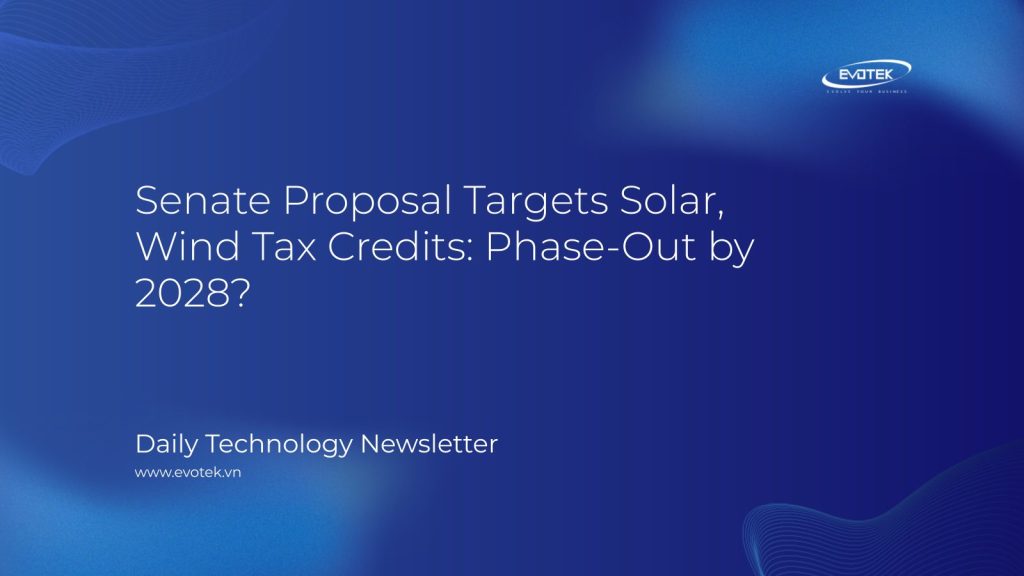Washington D.C. – A new budget proposal from the U.S. Senate is stirring debate in the renewable energy sector. The draft bill suggests a complete phase-out of tax credits for solar and wind energy projects by 2028, while extending incentives for hydropower, nuclear, and geothermal energy until 2036.
The proposed legislation, stemming from a broad Republican budget package, includes adjustments sought by clean energy advocates following the House’s earlier bill. However, industry representatives argue the Senate’s version doesn’t adequately protect crucial incentives for the solar and wind industries.
According to the draft released by Senator Mike Crapo, subsidies established under the Inflation Reduction Act would begin to decrease in 2026, dropping to 60% of their current value before being eliminated entirely by 2028. Current law allows these tax credits to remain until 2032.
In contrast to the House bill, the Senate proposes maintaining 100% tax credits for hydropower, nuclear, and geothermal facilities until 2033, followed by a gradual phase-out to zero by 2036.
Malcolm Woolf, CEO of the National Hydropower Association, acknowledged the extended timeline for new hydro facilities but expressed disappointment that the bill does not extend tax credits to upgrades of existing facilities.
A summary of the bill released by Senator Crapo indicated the elimination of substantial clean energy subsidies, which are viewed as unnecessary, and aims to support consistent energy sources over intermittent renewables.
News of the proposed changes led to a drop in shares of U.S. solar energy companies in extended trading on Monday.
“Despite modest improvements on several provisions, this legislation does not go far enough to remove the threat to one of the greatest economic success stories in American history,” stated Abigail Ross Hopper, president of the Solar Energy Industries Association.
The Senate version offers more time for clean energy projects to utilize tax credits compared to the House bill, which required project construction to begin within 60 days of the bill’s enactment and be operational by December 31, 2028, to qualify. The Senate bill focuses on the year construction begins rather than when the facility is placed in service.
Since the House passed its version of the budget last month, utility executives, lawmakers, and clean energy groups have urged Senate Republicans to moderate provisions related to the Inflation Reduction Act’s clean energy tax credits.
Key Senate moderates, including Lisa Murkowski and John Curtis, have advocated for giving clean energy projects more time to leverage the credits.
Similar to the House bill, the Senate version restricts tax credits for projects using equipment or minerals from foreign adversaries, such as China. However, the Senate bill provides some relief for publicly traded companies using Chinese materials.
The bill also introduces a formula for determining whether a project received “material assistance” from a foreign entity, potentially disqualifying it from incentives. Clean energy groups have opposed these restrictions due to their impact on projects relying on Chinese supply chains.
The Senate bill preserves project developers’ ability to sell or transfer their tax credits to third parties to lower financing costs, a provision phased out in the House bill.
Like the House bill, the Senate eliminates consumer credits for rooftop solar panel installations and other energy-related home improvements.
“Eliminating the tax credits that save families money is a profound mistake,” said Ari Matusiak, CEO of Rewiring America.
The electric utility industry, which had previously expressed concerns about potential cancellations of renewable energy projects due to the House version, acknowledged that the Senate version represents progress on project timelines and transferability.
“These modifications are a step in the right direction,” said Edison Electric Institute (EEI) interim President Pat Vincent-Collawn.

 日本語
日本語 한국어
한국어 Tiếng Việt
Tiếng Việt 简体中文
简体中文